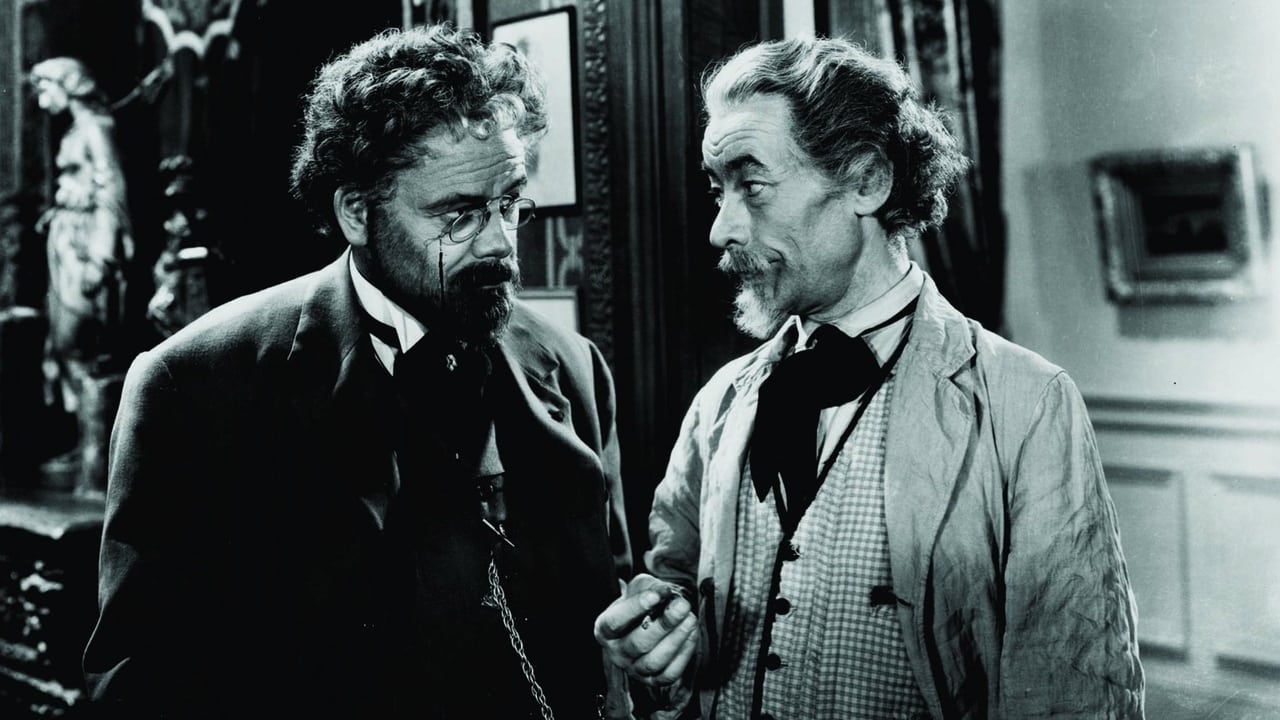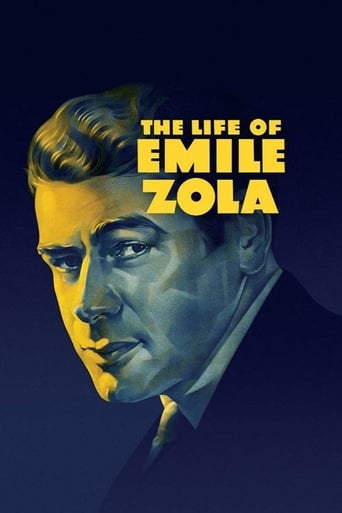

Very well executed
... View Morethe audience applauded
... View MoreSERIOUSLY. This is what the crap Hollywood still puts out?
... View MoreThis is a coming of age storyline that you've seen in one form or another for decades. It takes a truly unique voice to make yet another one worth watching.
... View MoreCopyright 14 July 1937 by Warner Bros. Pictures, Inc. New York opening at the Hollywood Theater, 11 August 1937. U.S. release: 2 October 1937. U.K. release: October 1937. Australian release: 3 February 1938. 13 reels. 116 minutes.SYNOPSIS: Emile Zola secures a new trial for the unjustly condemned Captain Alfred Dreyfus.NOTES: Academy Award, Best Picture (defeating The Awful Truth, Captains Courageous, Dead End, The Good Earth, In Old Chicago, Lost Horizon, 100 Men and a Girl, Stage Door and A Star Is Born).Academy Award, Supporting Actor, Joseph Schildkraut (defeating Ralph Bellamy in The Awful Truth, Thomas Mitchell in Hurricane, H. B. Warner in Lost Horizon and Roland Young in Topper). Academy Award, Best Screenplay (defeating The Awful Truth, Captains Courageous, Stage Door and A Star Is Born).Other Academy Award nominations: Paul Muni, Best Actor (winner was Spencer Tracy for Captains Courageous): William Dieterle, Directing (winner was Leo McCarey for The Awful Truth); Anton Grot, Art Direction (winner was Stephen Goosson for Lost Horizon); Sound Recording (winner was The Hurricane); Music Score (winner was 100 Men and a Girl). New York Film Critics Awards: Best Motion Picture; and Best Male Performance, Paul Muni. Best Picture of 1937, voted by the film critics of America in The Film Daily annual poll. Negative cost: $1,000,000. Domestic gross: $1,600,000 (including the 1938 re-issue). For another treatment of the Dreyfus case, see José Ferrer's I Accuse! (1958).COMMENT: The awards say it all. I think it's a marvelous movie: persuasive, forceful, compelling, compassionate, a rich emotional experience, with Muni, Schildkraut, Sondergaard and all the supporting players — with Dieterle and the whole array of his superlative Warner Bros. technicians — at the absolute peak of their form. One of the most stirring, involving and absolutely suspenseful films ever made. I was moved, thrilled, excited, fascinated — and that surely is what movies are all about. Lavishly produced and zestfully directed, The Life of Emile Zola is easily the most passionately powerful film of the 1930s.OTHER VIEWS: The fusing of realism and social consciousness into a high-charged entertainment was a specialty of the Warner Bros. studio during the 1930s. Not that other studios — even MGM — did not attempt this type of movie. They did. But it was Warner Bros. who not only led the way but crafted more movies in this category than all other production houses combined. The Life of Emile Zola is one of the most eminent examples of these superb entertainment skills. Muni gives the stand-out performance of his career (how Tracy's ridiculously phony Portuguese fisherman tipped Muni out of the Academy Award is a mystery I'll never solve) and Dieterle his most polished, pacey and pictorially dramatic job of imaginative directing.
... View MoreThe biopic of the famous French muckraking writer (Paul Muni) and his involvement in fighting the injustice of the Dreyfus Affair.Certain scenes have been interpreted in the context of the time as a reaction to the increasing repression of Nazi Germany. Critic David Denby in 2013 noted that, while the movie featured progressive rhetoric in Zola's last speech, overall it was "a perfect example of the half-boldness, half-cowardice, and outright confusion that marked Hollywood's response to Nazism and antisemitism in the nineteen-thirties." For instance, the film never mentioned "antisemitism" or "Jew".I find it very interesting that you can have a film about these topics without ever saying the words. Possible? Obviously. But it seems like you would almost have to go out of your way.One could question the relevance of this film today (2016). Not that the message is not important or anything like that, but who knows what the Dreyfus Affair was? A major historical event, yes, especially in France, but I doubt sincerely that 1 out of 100 Americans knows what it was about.
... View MoreÉmile is like the Julian Assange of 19th Century France, though certainly less dramatic. He comes under intense criticism as his books gain popularity and the censors are under pressure from the government and the French Army to stop them. The Dreyfus Affair was still well-known at the time of the film's release, but as a person watching for the first time 75 years later I got a little lost. I failed to see the connection between the two seemingly unrelated sub-plots and the ensuing period where there was little to no appearance of the film's namesake. This was eventually cleared up for me but the reliance on assumed knowledge was not very forward-thinking. One quibble is that the women did not seem to age, I had a similar complaint watching Cimarron; throughout the decades covered by the film Zola got older and cuddlier, Dreyfus aged even more...yet their wives hardly aged a day. I wish I knew their secret. Snaps for Joseph Schildkraut whose portrayal of Captain Alfred Dreyfus scored him an Oscar® for Best Supporting Actor. It was a good film and certainly highlighted the level of corruption in France at that time, as well as rooting for the underdog. I must procure one of Zola's books and check him out.
... View MoreThe first quarter of the film is a brief biography of most of the adult life of Zola. That's because the final portion centers on the last years of Zola's life and his attempt to gain Dreyfus his release from prison. Dreyfus had been sent to Devil's Island--convicted of sending French military secrets to foreign powers. Amazingly, when the true perpetrator was learned, the highest officers in the military decided NOT to punish the man responsible and keep Dreyfus in prison so they wouldn't lose face for convicting the wrong man!! I really enjoyed "The Life of Emile Zola" though could see that a very important part of the story is missing. I am NOT talking about the film taking a few artistic liberties--I certainly expected that. Instead, I am talking about a deliberate effort by the studio to misrepresent a major part of the story to make it more palatable to the general public. You see, about 3/4 of the movie concerns Zola and the Dreyfus Affair--yet it really makes no real effort to talk about the heart of why Dreyfus was convicted for a crime he clearly did not commit--because he was a convenient scapegoat because he was Jewish. The film BRIEFLY mentions he was Jewish but completely downplays this angle--mostly because I assume they were afraid antisemites in the US and abroad might find this unacceptable. Sadly, it makes this exceptional film just a bit less exceptional.What I liked about the film was the overall quality of the picture. It was well written, acted and just screams quality. Plus, compared to many other biopics of the era, this one is a little more accurate--as the facts of the story are essentially true (though rearranged and interpreted for dramatic effect). Still, I find it hard to believe it won the Oscar for Best Picture--though I must concede that Paul Muni was exceptional. If I could have picked, I would have given the nod to either "Lost Horizon" or "A Star is Born".
... View More